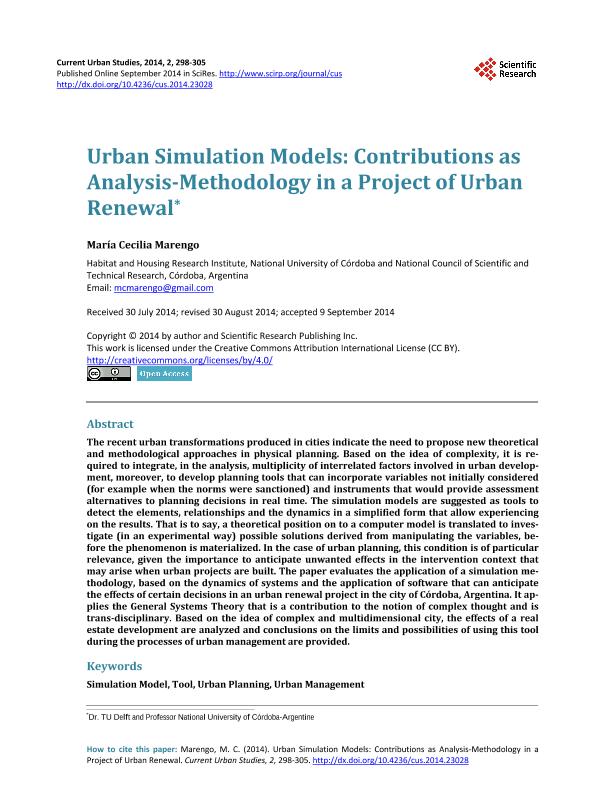Mostrar el registro sencillo del ítem
dc.contributor.author
Marengo, Maria Cecilia

dc.date.available
2020-03-19T14:47:59Z
dc.date.issued
2014-09
dc.identifier.citation
Marengo, Maria Cecilia; Urban Simulation Models: Contributions as Analysis-Methodology in a Project of Urban Renewal; Scientific Research Publishing; Current Urban Studies; 2; 3; 9-2014; 298-305
dc.identifier.issn
2328-4900
dc.identifier.uri
http://hdl.handle.net/11336/100189
dc.description.abstract
The recent urban transformations produced in cities indicate the need to propose new theoretical and methodological approaches in physical planning. Based on the idea of complexity, it is required to integrate, in the analysis, multiplicity of interrelated factors involved in urban development,moreover, to develop planning tools that can incorporate variables not initially considered (for example when the norms were sanctioned) and instruments that would provide assessment alternatives to planning decisions in real time. The simulation models are suggested as tools to detect the elements, relationships and the dynamics in a simplified form that allow experiencing on the results. That is to say, a theoretical position on to a computer model is translated to investigate (in an experimental way) possible solutions derived from manipulating the variables, before the phenomenon is materialized. In the case of urban planning, this condition is of particular relevance, given the importance to anticipate unwanted effects in the intervention context that may arise when urban projects are built. The paper evaluates the application of a simulation methodology,based on the dynamics of systems and the application of software that can anticipate the effects of certain decisions in an urban renewal project in the city of Córdoba, Argentina. It applies the General Systems Theory that is a contribution to the notion of complex thought and is trans-disciplinary. Based on the idea of complex and multidimensional city, the effects of a real estate development are analyzed and conclusions on the limits and possibilities of using this tool during the processes of urban management are provided.
dc.format
application/pdf
dc.language.iso
eng
dc.publisher
Scientific Research Publishing
dc.rights
info:eu-repo/semantics/openAccess
dc.rights.uri
https://creativecommons.org/licenses/by/2.5/ar/
dc.subject
SIMULATION MODEL
dc.subject
TOOL
dc.subject
URBAN PLANNING
dc.subject
URBAN MANAGEMENT
dc.subject.classification
Ciencias Sociales Interdisciplinarias

dc.subject.classification
Otras Ciencias Sociales

dc.subject.classification
CIENCIAS SOCIALES

dc.title
Urban Simulation Models: Contributions as Analysis-Methodology in a Project of Urban Renewal
dc.type
info:eu-repo/semantics/article
dc.type
info:ar-repo/semantics/artículo
dc.type
info:eu-repo/semantics/publishedVersion
dc.date.updated
2020-03-12T18:58:00Z
dc.journal.volume
2
dc.journal.number
3
dc.journal.pagination
298-305
dc.journal.pais
Estados Unidos

dc.description.fil
Fil: Marengo, Maria Cecilia. Consejo Nacional de Investigaciones Científicas y Técnicas; Argentina. Universidad Nacional de Córdoba. Facultad de Arquitectura, Urbanismo y Diseño. Instituto de Investigación de la Vivienda; Argentina
dc.journal.title
Current Urban Studies
dc.relation.alternativeid
info:eu-repo/semantics/altIdentifier/doi/http://dx.doi.org/10.4236/cus.2014.23028
dc.relation.alternativeid
info:eu-repo/semantics/altIdentifier/url/https://www.scirp.org/journal/paperinformation.aspx?paperid=50199
Archivos asociados
